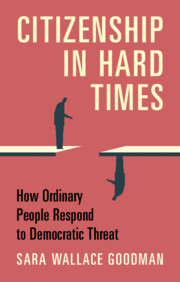Book contents
- Citizenship in Hard Times
- Citizenship in Hard Times
- Copyright page
- Dedication
- Contents
- Figures
- Tables
- Acknowledgments
- 1 Introduction
- 2 Citizenship and Democratic Instability
- 3 Measuring Citizenship Norms
- 4 Patterns of Partisan Citizenship
- 5 The Threat of Polarization
- 6 Foreign Interference in Elections
- 7 Conclusion
- Book part
- References
- Index
6 - Foreign Interference in Elections
Published online by Cambridge University Press: 22 January 2022
- Citizenship in Hard Times
- Citizenship in Hard Times
- Copyright page
- Dedication
- Contents
- Figures
- Tables
- Acknowledgments
- 1 Introduction
- 2 Citizenship and Democratic Instability
- 3 Measuring Citizenship Norms
- 4 Patterns of Partisan Citizenship
- 5 The Threat of Polarization
- 6 Foreign Interference in Elections
- 7 Conclusion
- Book part
- References
- Index
Summary
How do citizens respond to information on electoral interference in their country? Chapter 6 presents the second vignette survey experiment, and we again see individuals taking distinct positions on citizenship norms that correspond to partisanship. Like in polarization, we see status quo challengers respond to threat. Unlike polarization, they respond not with norms of liberal democratic beliefs but with behavior – that is, expectations of a more active, engaged citizenry. Moreover, we also observe a strong status quo bias, in which winners of the election in question generally do nothing. Where norms are affected for citizens supporting incumbent power holders, we observe impatience (US) and demobilization (UK). Meanwhile, the partisan left – as governing outsiders and losers of the elections in question – are more likely to value vigilance – watching the government (US, UK) and understanding how politics and the government work (UK, Germany), alongside other active, engaged citizenship attributes. Evidence of interference in majoritarian systems, compared to Germany’s consensus political system, produces stronger partisan differences.
- Type
- Chapter
- Information
- Citizenship in Hard TimesHow Ordinary People Respond to Democratic Threat, pp. 145 - 176Publisher: Cambridge University PressPrint publication year: 2022



